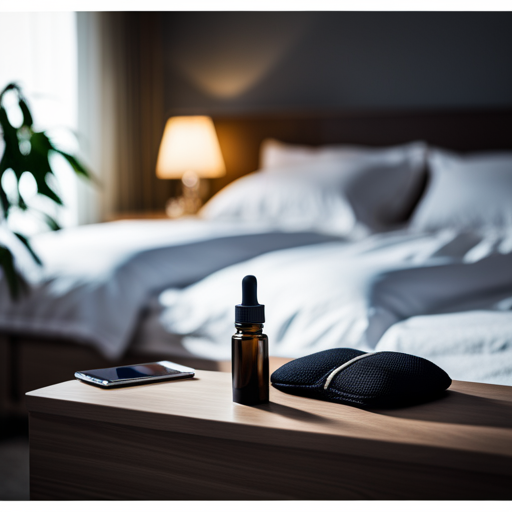Sleep is a fundamental physiological process that plays a crucial role in maintaining overall health and well-being.
However, for many individuals, achieving a restful night’s sleep can be elusive due to the prevalence of sleep disorders.
These disorders can have a significant impact on daily functioning, mood, and overall quality of life.
As a result, there is a growing interest in finding safe and effective interventions to improve sleep quality.
One such intervention that has gained attention is CBD, a cannabinoid compound derived from the cannabis plant.
This article aims to explore the potential effects of CBD on sleep quality, unraveling the scientific evidence behind its use and its role in reducing anxiety and promoting relaxation.
Sleep disorders, such as insomnia, sleep apnea, and restless leg syndrome, are prevalent and can have profound consequences on an individual’s physical and mental health.
These disorders are characterized by difficulties in falling asleep, staying asleep, or experiencing non-restorative sleep.
The consequences of poor sleep quality extend beyond feeling tired or sluggish during the day.
Chronic sleep disorders have been linked to an increased risk of developing chronic conditions such as cardiovascular disease, diabetes, and mental health disorders.
Therefore, finding effective interventions to improve sleep quality is of utmost importance.
CBD, or cannabidiol, has emerged as a potential candidate for improving sleep quality due to its interaction with the endocannabinoid system, a complex network of receptors and neurotransmitters involved in regulating various physiological processes.
This article will delve into the scientific evidence behind CBD’s potential effects on sleep, focusing on its role in reducing anxiety and promoting relaxation.
Additionally, it will discuss the different forms of CBD products available on the market and provide insights on how to choose the right product for sleep improvement.
By unraveling the effects of CBD on sleep quality, this article aims to provide evidence-based information to individuals seeking a natural and safe intervention for achieving sweet dreams.
Key Takeaways
– CBD is a potential intervention for improving sleep quality.
– CBD may reduce anxiety and promote relaxation, leading to better sleep.
– CBD can increase the production of melatonin, promoting faster sleep onset and restful sleep.
– CBD can enhance deep sleep, leading to improved memory and cognitive function.
Understanding Sleep Disorders and their Impact on Health
Sleep disorders have a profound impact on overall health, necessitating a comprehensive understanding of their nature and consequences.
One common sleep disorder is sleep deprivation, which refers to the inadequate amount of sleep an individual gets on a regular basis. Sleep deprivation not only leads to daytime sleepiness and decreased alertness, but it also has numerous negative consequences on physical and mental health.
Studies have shown that chronic sleep deprivation can impair cognitive function, memory retention, and decision-making abilities. It can also weaken the immune system, making individuals more susceptible to infections and diseases. Furthermore, sleep deprivation has been linked to an increased risk of developing chronic conditions such as obesity, diabetes, and cardiovascular diseases.
Another significant aspect of sleep disorders is the relationship between poor sleep and mental health. Research has consistently shown that inadequate sleep can contribute to the development and exacerbation of mental health disorders such as anxiety and depression. Sleep disturbances can increase the risk of developing these conditions and also worsen the symptoms in individuals who already suffer from mental health disorders.
The exact mechanisms underlying this relationship are not fully understood, but it is believed that disruptions in sleep patterns can disrupt the balance of chemicals in the brain, leading to mood disturbances and emotional instability. Additionally, poor sleep quality can affect emotional regulation, making individuals more susceptible to stress and negative emotions.
Therefore, addressing sleep disorders and promoting healthy sleep habits is crucial for maintaining optimal mental health.
The Science Behind CBD and its Potential Effects on Sleep
The scientific research surrounding the potential impact of CBD on sleep has yielded intriguing results. One study, in particular, reported an average increase of 30 minutes in total sleep time among participants who consumed CBD. This suggests that CBD may have the potential to improve both the duration and quality of rest.
One possible explanation for CBD’s effects on sleep is its interaction with the hormone melatonin. Melatonin is responsible for regulating the sleep-wake cycle, and studies have shown that CBD can increase the production of this hormone. By promoting the release of melatonin, CBD may help individuals fall asleep faster and experience a more restful sleep.
Additionally, CBD has been found to influence sleep architecture, which refers to the different stages of sleep. Research has shown that CBD can increase the amount of time spent in deep sleep, also known as slow-wave sleep. This is the stage of sleep that is crucial for physical and mental restoration. By enhancing deep sleep, CBD may contribute to improved memory, mood, and overall cognitive function.
While the research on CBD and sleep is still in its early stages, these findings suggest that CBD may hold promise as a natural sleep aid. However, it is important to note that individual responses to CBD can vary, and more research is needed to fully understand its effects on sleep. It is always recommended to consult with a healthcare professional before incorporating CBD into your sleep routine.
Exploring the Role of CBD in Reducing Anxiety and Promoting Relaxation
One intriguing aspect of CBD’s potential benefits is its role in reducing anxiety and promoting relaxation.
Anxiety and stress are common factors that can disrupt sleep quality, leading to difficulty falling asleep and staying asleep throughout the night.
CBD, or cannabidiol, is a natural compound derived from the hemp plant that has gained attention for its potential therapeutic effects.
Research suggests that CBD may interact with the body’s endocannabinoid system, which plays a role in regulating sleep, mood, and stress response.
By targeting certain receptors in the brain, CBD may help reduce anxiety and promote a sense of relaxation, which can contribute to improved sleep quality.
A growing body of evidence supports the use of CBD as a natural sleep aid.
In a study published in The Permanente Journal, researchers investigated the effects of CBD on sleep and anxiety in a clinical population.
The study found that participants who received CBD reported lower anxiety scores and improved sleep scores compared to those who received a placebo.
Another study published in the Journal of Clinical Psychology found that CBD was effective in reducing anxiety in individuals with social anxiety disorder.
By addressing underlying anxiety and promoting relaxation, CBD may indirectly improve sleep quality by reducing the factors that contribute to sleep disturbances.
However, it is important to note that further research is needed to fully understand the mechanisms and potential benefits of CBD on sleep quality.
Addressing Insomnia: Can CBD Help with Sleep Onset and Maintenance?
Addressing the issue of insomnia, investigating the potential of CBD in aiding sleep onset and maintenance reveals promising findings.
Insomnia, characterized by difficulty falling asleep or staying asleep, affects a significant portion of the population and can have detrimental effects on overall health and well-being.
Recent research suggests that CBD, a non-psychoactive compound derived from the cannabis plant, may offer potential benefits in improving sleep quality.
Studies have found that CBD may help with sleep by interacting with the body’s endocannabinoid system (ECS), which plays a role in regulating sleep-wake cycles.
CBD is believed to have anxiolytic and sedative effects, which can promote relaxation and reduce anxiety, leading to improved sleep onset. Additionally, CBD has been shown to have a positive impact on sleep maintenance by reducing the frequency of awakenings during the night.
However, it is important to note that the optimal dosage of CBD for sleep is not yet established, and individual responses may vary. It is recommended to start with a low dose and gradually increase until the desired effect is achieved.
While CBD appears to be a promising option for addressing insomnia, it is crucial to consider potential side effects. Although CBD is generally well-tolerated, some individuals may experience adverse effects such as drowsiness, dry mouth, and changes in appetite.
Additionally, CBD can interact with certain medications, so it is important to consult with a healthcare professional before incorporating CBD into a sleep regimen.
Further research is needed to better understand the long-term effects and optimal usage of CBD for sleep improvement.
Overall, the potential benefits of CBD in aiding sleep onset and maintenance make it an intriguing area of study for those seeking natural alternatives to improve their sleep quality.
Navigating the Market: Choosing the Right CBD Products for Sleep Improvement
Navigating the vast array of options in the CBD market can be overwhelming, but finding the right product that aligns with individual sleep improvement goals is essential.
When it comes to CBD products for sleep improvement, there are several options available. These include CBD oils, capsules, gummies, and even topical creams. Each product has its unique advantages and disadvantages, so it is important to consider personal preferences and needs.
For example, CBD oils are versatile and can be taken orally or applied topically, while capsules offer a convenient and precise dosage. Gummies are a popular choice for those who prefer a tasty treat, and topical creams may be beneficial for localized relief.
It is crucial to research and read product labels carefully to ensure they are from reputable sources and contain accurate CBD content.
Another important factor to consider when choosing the right CBD product for sleep improvement is finding the appropriate dosage. CBD affects individuals differently, and there is no one-size-fits-all approach. It is recommended to start with a low dosage and gradually increase until the desired effects are achieved. Consulting with a healthcare professional or CBD specialist can also provide valuable guidance in determining the appropriate dosage.
Additionally, it is essential to choose CBD products that undergo third-party testing for quality and purity. These tests can verify the CBD content and screen for any potential contaminants.
By considering individual preferences, finding the right dosage, and selecting reputable products, individuals can make informed decisions when navigating the CBD market for sleep improvement.
Frequently Asked Questions
Are there any potential side effects or risks associated with using CBD for sleep improvement?
There is evidence to suggest that CBD can cause liver damage and daytime drowsiness. These potential side effects should be considered when using CBD for sleep improvement. Further research is needed to fully understand the risks involved.
Can CBD interact with other medications that I am currently taking for sleep disorders?
Interactions between CBD and sleep medications raise safety concerns. Research on the topic is limited, but potential interactions could occur due to CBD’s effect on liver enzymes. Further investigation is needed to determine the extent of these interactions and their implications for individuals with sleep disorders.
How long does it typically take for CBD to start working and improve sleep quality?
The time it takes for CBD to start working and improve sleep quality varies. Recommended dosage and strains for CBD use in sleep disorders can provide more efficient results, but further research is needed.
Is there a recommended dosage of CBD for sleep improvement?
Finding the recommended dosage of CBD for sleep improvement is crucial. Other alternative remedies can be explored. Objective scientific research, based on evidence, can guide us towards the most effective and safe dosing strategies for better sleep.
Are there any specific types or strains of CBD that are more effective for promoting better sleep?
CBD strains for sleep and the best CBD products for sleep vary in their effectiveness. Research shows that strains high in THC and CBD, such as Granddaddy Purple and ACDC, may promote better sleep due to their sedating and relaxing effects.









